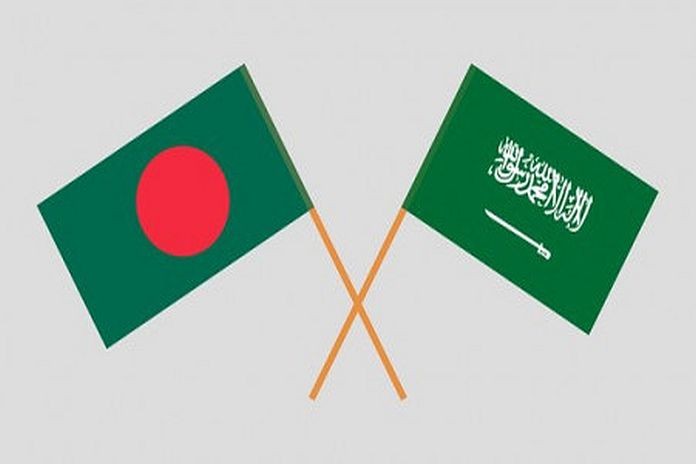By Samina Akhter
With the aim of increasing bilateral trade and mutual economic cooperation, special attention must be paid to the ‘Middle East’.
Bangladesh seeks cooperation in at least 12 sectors from the top ten countries of the Arab world or the Middle East to overcome the ongoing power and energy crisis, the impact of the Russia-Ukraine war and the financial loss of the epidemic corona. One of these is the power and energy sector.
Maximum emphasis has been placed on easy terms of investment and energy imports from the Middle East in this sector. In addition to this, the government is interested in new manpower exports and product exports to collect remittances, one of the sources of foreign exchange. A meeting of Bangladesh-Saudi Arabia Joint Commission (JC) has been called in Riyadh, Saudi Arabia by the end of this month.
Looking ahead to that meeting, Saudi Arabia wanted to know what kind of cooperation Bangladesh wants to increase bilateral trade. The Economic Relations Department (ERD) will present an outline of economic cooperation and investment at the JC meeting itself.
It is known that assistance will be sought from the Middle East to resolve the ongoing power and energy crisis. Frequent load-shedding and rising prices of all types of fuel have increased the cost of production in the country. Its biggest impact is noticeable in inflation. In addition to this, the majority of remittances come from Middle Eastern countries. Due to this reason, the stakeholders have urged to increase mutual economic cooperation and bilateral trade with the Middle East. More than 80 percent of the fuel oil used in Bangladesh is imported from some countries in the Middle East including Saudi Arabia.

Similarly, most remittances are being extracted by exporting unskilled manpower to Middle Eastern countries. Most of the fertilizers used in agricultural production are imported from the Middle East. But the economy of Bangladesh is under pressure due to the ongoing global crisis and the increase in dollar prices. Inflation is increasing.
In this situation, the dollar crisis and the increase in the price of all types of fuel are making it more difficult to maintain the continuity of production. As a result, there is increased load shedding and disruption of production. Initiatives have been taken to increase mutual cooperation with Middle East countries to overcome the current situation. Bangladesh is dreaming of developing economic relations with the Middle East.
The government is preparing to attend the 14th JC meeting to be held in Riyadh, Saudi Arabia on October 30-31. Bangladesh will be represented in that meeting by high-level representatives of the economic relations department of the ministry of finance. Before attending the meeting, ERD held several inter-ministerial meetings on the initiative of the ministry of finance.
In these meetings, economic relations with other countries of the Middle East, including Saudi Arabia, have been urged to be strengthened and bilateral trade increased. Besides, cooperation in 12 sectors will be sought from the Middle East. These include the development of bilateral economic and trade relations, manpower, employment and consular, private aviation, tourism and cultural, investment, Abu Dhabi Development Fund, electricity, energy and mineral resources, information and communication technology sector, education, science and technology sector, and marine environment. Cooperation in development, agriculture, healthcare and health education sectors and humanitarian and charitable assistance is one of them.
Saudi Arabia has already expressed its positive attitude towards increasing cooperation with Bangladesh. Not only that, Bangladesh-Saudi Arabia has signed several agreements and memoranda of understanding to increase bilateral trade and investment. In addition, bilateral trade and economic cooperation with Saudi Arabia will be increased with the United Arab Emirates, Qatar, Bahrain, Oman, Iraq, Kuwait, Lebanon, Egypt and Turkey.
An official letter has been given to these countries by the Commercial Counselor of Bangladesh Embassy abroad to increase bilateral trade and manpower export. Besides, the government has taken a special initiative from the Middle East Branch-1 of the Economic Relations Department (ERD). An outline in this regard will also be presented in the JC meeting to be held with Saudi Arabia. Bangladesh Investment Development Authority (BIDA) has a separate program around the Middle East.
Saudi Arabia has already been informed about ensuring one-stop service from the bidder’s side. ERD believes that if mutual economic cooperation with Saudi Arabia, the top country of the Arab world, increases, bilateral trade with other countries in the Middle East will also increase.
And for this reason, preparations are being made vigorously in front of the 14th JC meeting. A high-level delegation from Bangladesh is expected to participate in the meeting. In this regard, finance minister AHM Mustafa Kamal said that currently there is an excellent environment for investment in Bangladesh. There is considerable potential for investment on Public-Private Partnership (PPP) basis, particularly in major infrastructure, information technology, communication, agriculture, power and energy, medical sectors.
Middle East entrepreneurs including Saudi Arabia can take investment opportunities in those sectors if they wish. Professional, skilled, semi-skilled and unskilled manpower is still in great demand in the Arab world. Middle East countries can take huge manpower from Bangladesh if they want. He said that the country’s electricity and energy sector needs investment and cooperation from the Middle East, including Saudi Arabia. To deal with the ongoing crisis, the government will take the cooperation of Saudi Arabia and other countries in the power and energy sector.
According to Bangladesh Petroleum Corporation or BPC data, the country imports 6.5 million tons of fuel oil annually. Of that, 4 million tons of diesel is imported annually. More than 90 percent of vehicles in the transport sector in the country are dependent on fuel oil. Again, 34 percent of the power generation capacity depends on fuel oil.
For these fuels, we have to depend on Saudi Arabia and other countries in the Middle East. Bangladesh imports refined and crude fuel oil. The foreign companies supplying oil are Saudi Arabian Oil Company (Saudi Aramco) of Saudi Arabia, Abu Dhabi National Oil Company Limited (ADNOC) of the United Arab Emirates, Kuwait Petroleum Corporation (KPC) of Kuwait, Petco Trading Labuan Company Limited (PTCL) of Malaysia, Emirates National Oil of the United Arab Emirates. Company (Inc), China’s PetroChina (Singapore) Pte Ltd and Unipec (Singapore) Pte Ltd, Indonesia’s PT Bumi Siak Pusaku (BSP), Thailand’s PTT International Trading Pte Ltd, India’s Numaligarh Refinery Limited (NRL).
Apart from this, BPC also buys fuel oil through open tender. In other words, more than 80 percent of fuel oil is imported from Middle East countries including Saudi Arabia. Earlier in 2019, two agreements and four memorandums of understanding were signed with Saudi Arabia for the development of various sectors of Bangladesh, including the power and industrial sectors. These agreements and agreements were made in the presence of Prime Minister Sheikh Hasina in a ceremony organized at her office.
If these agreements are implemented, the country’s bilateral trade and investment with Bangladesh will increase. It is believed that both countries will benefit economically. Especially the ongoing crisis in the power and energy sector of the country will be removed. Besides, bilateral trade with Saudi Arabia also has great opportunities and possibilities.
In addition, Saudi Arabia’s state-owned oil company Aramco has already shown interest in building, operating and maintaining an oil refinery. It will cost 1.5 to 2 billion dollars. Saudi firm Engineering Dimension LLC is very enthusiastic about investing in Bangladesh.
The company is interested in investing in 7 projects and has pledged to invest around 1.685 billion dollars during the International Investment Conference held in Dhaka in November last year. Saudi Arabia’s investment in the power and energy sector is urgently needed at the moment. This issue should be given maximum emphasis in any forum discussion with the country.
Engineering Dimension is one of the companies that have shown interest in the construction of Dhaka East-West Elevated Expressway. Some Saudi investments are already in the pipeline. These include the development of Patenga Container Terminal with Red Sea Gateway Terminal in Public Private Partnership. Further Saudi investment will largely depend on how successfully the projects in the pipeline can be managed.
ACWA Power, an internationally renowned energy company, has expressed interest in investing around $600 million to build a 730 MW combined cycle power plant in Chittagong. Al-Fanar plans to invest $100 million to build a 100 MW IPP solar project in a joint venture. Al-Bawani is interested in investing about $10 million in the employment of skilled human resources for construction and engineering projects.
Bangladesh-Saudi Arabia joint commission meeting preparation
Preparations for the 14th meeting of the Bangladesh-Saudi Arabia Joint Commission have started in full swing. The Economic Relations Department (ERD) of the Ministry of Finance prepared the working paper on behalf of Bangladesh. In the meeting to be held in Riyadh, Saudi Arabia on October 30-31, the cooperation of Saudi Arabia will be sought in the export of electricity, manpower, increasing the export of manufactured goods, export of halal products, especially fish and meat, export of agricultural processed products and fertilizer production.
Besides, Bangladesh has the opportunity to export clothes to other Middle East countries including Saudi Arabia. The entrepreneurs of the country’s garment sector have expressed their interest in this regard. Saudi Arabia will be requested to speedily implement the agreements made with Saudi Arabia at various times. In this context, Bangladesh has prepared for the Bangladesh-Saudi Arabia joint commission meeting.
Bangladesh has several bilateral trade investment agreements with Saudi Arabia. These agreements must be implemented now. It is reported that talks are going on between Petrobangla and Aramco regarding a liquefied natural gas (LNG) deal. This will solve the country’s LNG crisis. Besides, Eastern Refinery Unit-2 has sought Saudi Arabia’s cooperation in processing 3 million tons of crude palm oil per day.
If it is implemented, 68 thousand barrels of refined petroleum will be available. MoU will be signed between Bangladesh Power Development Board and world-renowned ACWO Power. It is expected to make great progress in the renewable energy sector in the country. It has an agreement with Saudi Arabia to build a 100 MW Solar Independent Power Plant (IPP) and manufacture transformers and electrical components.
These agreements need to be implemented quickly. Meanwhile, 20 more Saudi Arabian companies have shown interest in investing in Bangladesh, said foreign minister Dr AK Abdul Momen recently. After a recent meeting with a delegation of Saudi Arabia, he added, “We will give them all the facilities they need.” Both countries have much more to do in terms of trade and investment cooperation.
Besides, the country is also interested in investment on the basis of public-private partnerships or PPP. Saudi Arabia will mainly invest in Bangladesh’s infrastructure, medical, tourism and other sectors. A memorandum of understanding has been signed with Saudi Arabia. Salman F Rahman, adviser to the prime minister on private industry and investment on behalf of Bangladesh, signed one such MoU a few months ago.
However, in countries of the Middle East, especially Saudi Arabia’s investment in the power and energy sector is urgently needed at the moment.





